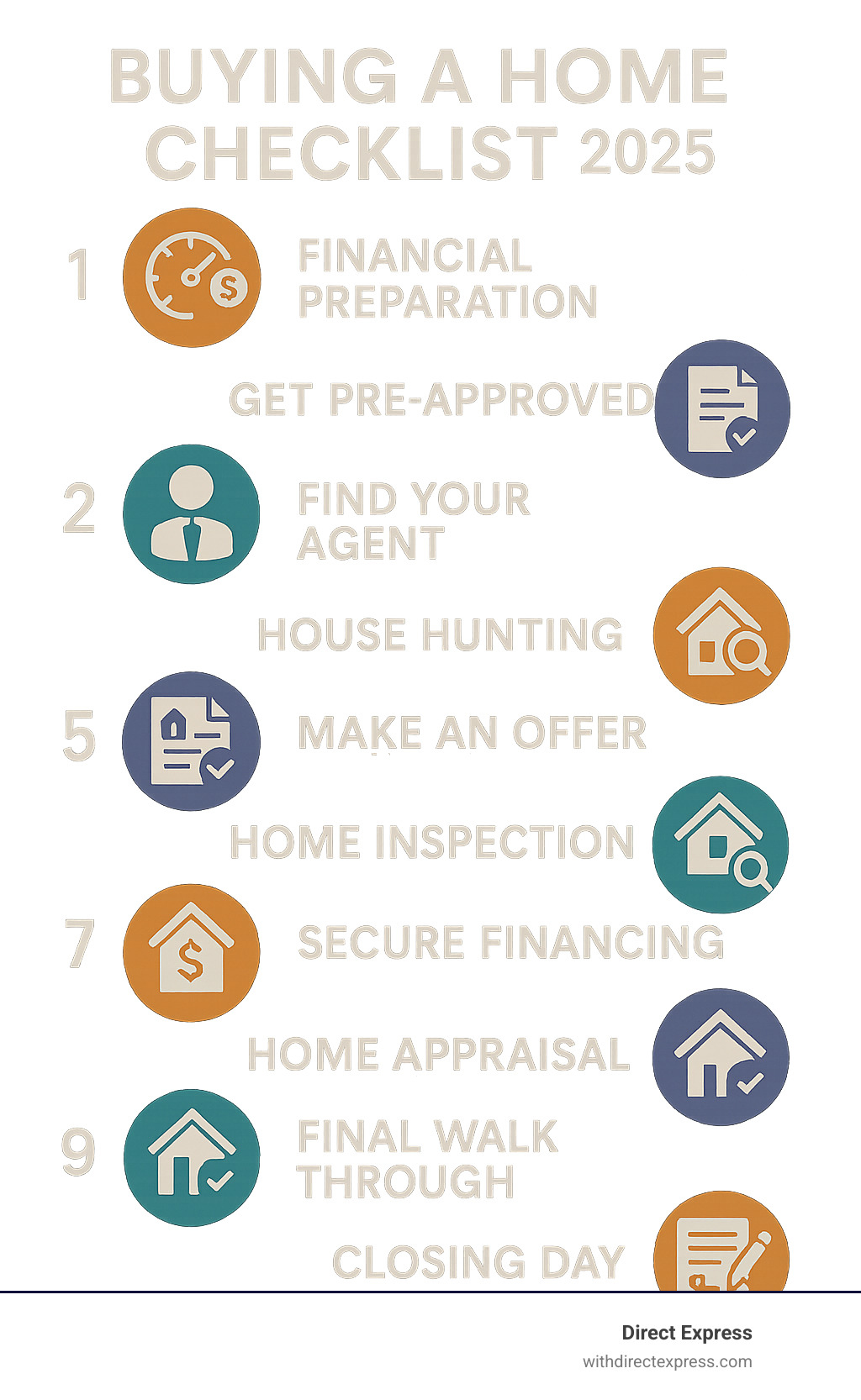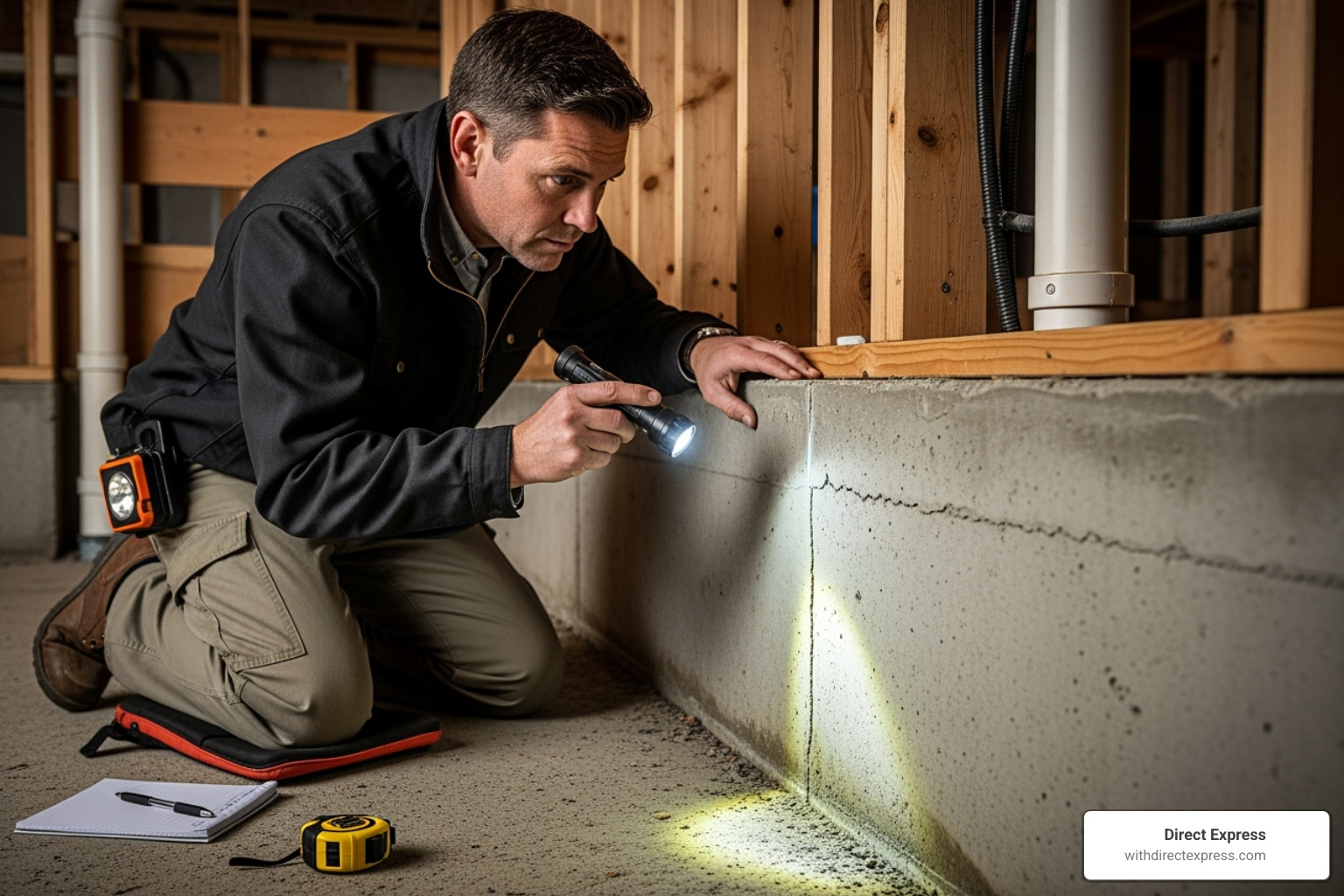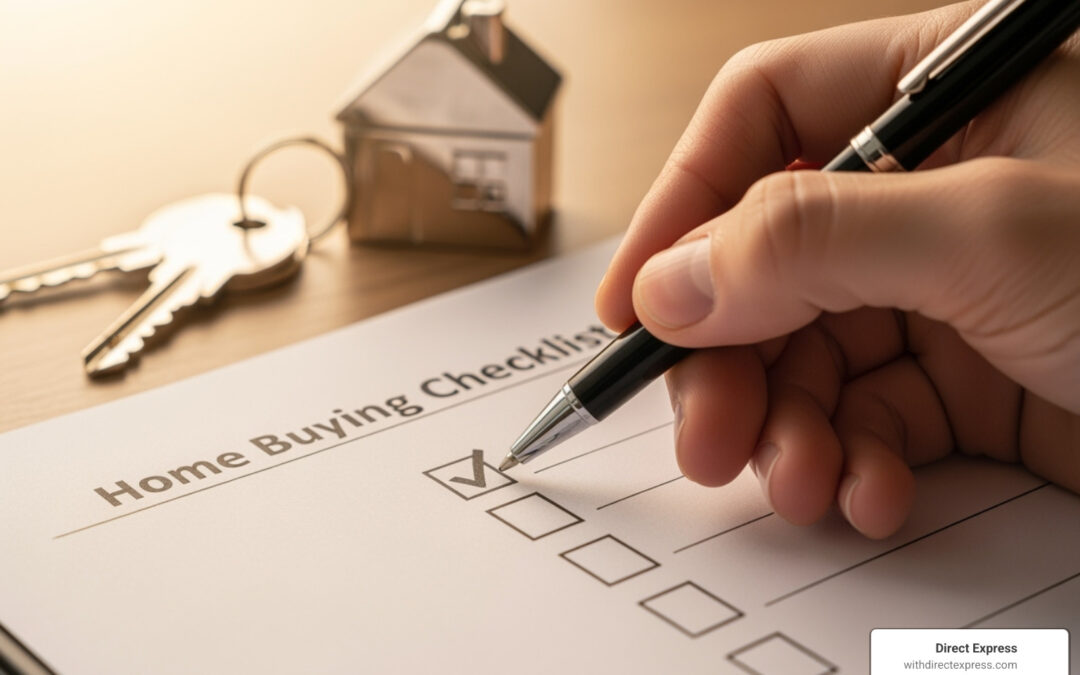Why Every Home Buyer Needs a Strategic Checklist
A buying a home checklist is your roadmap through one of life’s biggest financial decisions. The average home buying process takes about four months and involves countless steps that can overwhelm any buyer.
Essential Home Buying Checklist Steps:
- Financial Preparation – Check credit score, calculate debt-to-income ratio, save for down payment
- Get Pre-Approved – Secure mortgage pre-approval from multiple lenders
- Find Your Agent – Choose a buyer’s agent with local market expertise
- House Hunting – Create wish list, tour properties, evaluate neighborhoods
- Make an Offer – Include contingencies and earnest money deposit
- Home Inspection – Hire qualified inspector, identify potential issues
- Secure Financing – Finalize mortgage, arrange homeowners insurance
- Home Appraisal – Lender confirms property value matches loan amount
- Final Walk-Through – Verify property condition before closing
- Closing Day – Sign documents, transfer funds, receive keys
Without organization, you risk missing critical steps, overpaying, or buying a property with hidden problems. A systematic approach makes the process manageable. Buyers with experienced agents are more likely to find the right home, and those with mortgage pre-approval can close faster in competitive markets.
I’m Joseph Cavaleri, a real estate broker and CEO with two decades of experience. At Direct Express Realty, I’ve seen that organized buyers who use a checklist achieve better outcomes with less stress.

Know your buying a home checklist terms:
Phase 1: Financial Preparation & Assembling Your Team
Before browsing listings, the first phase in your buying a home checklist is getting your finances and professional team in order. This foundational work makes you a more confident and competitive buyer.

Getting Your Finances in Order
Understanding your financial standing is paramount.
- Credit Score: Your credit score heavily influences mortgage rates. Lenders prefer scores over 760 for the best rates, but aim for the 700s or higher. Request your free annual credit report from Experian, Equifax, and TransUnion to check for and correct any errors.
- Debt-to-Income Ratio (DTI): This measures your monthly debt against your gross monthly income. Lenders typically require a DTI of 43% or less. A lower DTI provides greater financial flexibility.
- The 28/36 Rule: This guideline suggests your housing costs (PITI) should be under 28% of your gross monthly income, and total debt under 36%. This helps ensure you can afford other expenses.
- Saving for a Down Payment: A 20% down payment helps avoid Private Mortgage Insurance (PMI), but it’s not always required. First-time buyers average a 7% down payment. Options like conventional (3-5%), FHA (3.5%), and even VA/USDA (0%) loans exist. A larger down payment means a smaller loan and lower monthly payments.
- Budgeting for Future Homeownership Costs: Budget for ongoing costs like property taxes, insurance, and potential HOA fees. Also, maintain an emergency fund for unexpected repairs, as a home inspection can reveal issues costing thousands.
If you need help with these financial aspects, Talk to a HUD-approved housing counseling agency for unbiased advice.
The Power of Mortgage Pre-Approval
Once your finances are in order, get mortgage pre-approval.
- Pre-qualification vs. Pre-approval: Pre-qualification is a rough estimate based on self-reported info. Pre-approval is a conditional commitment from a lender after a full review of your finances, including a hard credit pull.
- Competitive Advantage: A pre-approval letter makes your offer much stronger, showing sellers you’re a serious, qualified buyer, which can lead to faster closing times.
- Setting a Realistic Budget: Pre-approval gives you a clear understanding of how much home you can truly afford.
- Shopping for Lenders: Don’t settle for the first offer. Compare rates and terms from various lenders, including national banks, local banks, and credit unions. Shopping around can save you thousands.
At Direct Express, we offer comprehensive mortgage services to guide you. Find More info about our Mortgage services to get started.
Finding the Right Real Estate Agent
Your real estate agent is your trusted guide and a vital part of your team.
- Role of a Buyer’s Agent: A buyer’s agent provides local market knowledge, helps with complex paperwork, and advocates for your best interests. They can save you money and find homes that meet your needs.
- Market Knowledge & Negotiation Skills: A good agent understands property values and has effective negotiation strategies to ensure you get a fair deal.
- Navigating Paperwork: Your agent will help you understand contracts, disclosures, and other legal forms.
- Finding a Trusted Professional: Ask for recommendations and interview several agents. Find someone with experience in your desired area (like our experts serving St. Petersburg, Tampa Bay, Palm Harbor, Lutz, Wesley Chapel, Tampa, Largo, and Parrish, Florida) and good communication skills. The seller typically pays the buyer’s agent commission, so you get professional help at no direct cost.
We can connect you with the right agents. Find More info about our Realty Buy services and let us help you find your perfect match.
Phase 2: The Ultimate House Hunting Checklist
With your finances sorted and team assembled, it’s time for the fun part: house hunting. The average buyer tours 10 homes, so being organized is key. Make copies of this checklist to fill out for each home you tour for easy comparison.

Your complete buying a home checklist: Interior Inspection
Look beyond the staging and focus on practical details to avoid future headaches.
- Layout & Storage: Does the floor plan suit your lifestyle? Is there enough storage in closets, the pantry, and built-ins? Measure rooms to ensure your furniture will fit.
- Wall & Floor Condition: Check for warped floors, wall bubbling, or large cracks (wider than 1/8 inch), which can signal water damage or foundation issues. Look under rugs for hidden problems.
- Windows & Natural Light: How much natural light does the home get? Check windows for fogging, moisture, or drafts, as replacements are costly and impact energy bills.
- Kitchen & Bathrooms: In the kitchen, check the layout, counter space, and cabinet condition. Test sink fixtures and water pressure. In bathrooms, check for mold, especially in showers, and ensure toilets flush properly.
- Appliances & Systems: If appliances are included, note their age and condition. The age of the hot water tank (typically lasts 10 years) and HVAC system is crucial for budgeting future replacements.
- Odors & Air Quality: Be aware of musty smells that could indicate mold or mildew. Lingering pet or smoke odors are hard to remove. Numerous air fresheners might be hiding an issue.
- Unpermitted Additions: Ask about permits for any major renovations. Unpermitted work can lead to city fines or costly removal.
Don’t Judge a Book by its Cover: Exterior & Structural Checks
The exterior is just as important as the interior for spotting potential money pits.
- Roof & Foundation: Ask about the roof’s age and look for missing or curling shingles. Check the foundation for large cracks in brickwork or stucco, which could indicate structural problems.
- Gutters & Drainage: Ensure gutters are clean and direct water away from the foundation. Poor drainage can lead to foundation damage.
- Siding & Paint: Look for peeling paint, damaged siding, or signs of dry rot, which indicate deferred maintenance.
- Yard & Landscaping: A soggy lawn could signal a broken sewer line. Check fences for integrity and note any large trees too close to the house, as roots can cause issues.
- Patios, Decks & Garage: Check decks and patios for rot or instability. Ensure your vehicles will fit in the garage and that the overhead door functions correctly.
Beyond the Front Door: Neighborhood & Community Vitals
You’re buying into a community, not just a house.
- Schools, Commute & Amenities: Research school district ratings. Check commute times to work and other frequent destinations. Ensure convenient access to supermarkets, hospitals, parks, and public transport.
- Safety & Noise: Research local crime rates. Visit at different times to gauge noise levels from roads, airports, or trains.
- Taxes & HOA: Find out the average property taxes. If there’s a Homeowner Association (HOA), get a copy of the rules to ensure they fit your lifestyle.
Key Questions for Your buying a home checklist
Your agent can help you ask the seller these crucial questions:
- Why is the owner selling?
- How old are the HVAC system, roof, and water heater?
- Have there been any major renovations? If so, were they permitted?
- What is included in the sale (appliances, fixtures, etc.)? Get it in writing.
- If the home is listed “as is,” understand the seller will not make repairs.
- Are there any known problems that need to be addressed?
Once a home checks all your boxes, you’re ready to Making an offer.
Phase 3: From Offer to Home Inspection
You’ve found a strong contender! This phase of your buying a home checklist is about making a formal offer and performing your due diligence to ensure the property is a sound investment.

Crafting and Negotiating Your Offer
Making an offer requires strategy. Your real estate agent will help you steer this negotiation.
- Offer Price: Your agent will pull comparable sales (“comps”) to help you determine a fair offer price. In competitive markets, cash offers are often preferred, but a strong, pre-approved financed offer is also compelling.
- Earnest Money Deposit: This deposit, typically 1-3% of the purchase price, is held in escrow and shows the seller you’re serious. It applies toward your down payment at closing.
- Contingencies: These are your safety nets. An inspection contingency lets you back out or renegotiate if major issues are found. A financing contingency protects you if your loan falls through, and an appraisal contingency is crucial if the home’s value comes in lower than the price.
Understanding Key Home Buying Documents
Understanding this paperwork can save you from costly surprises.
- Purchase Agreement: This legally binding contract outlines all terms of the sale, from price to closing date. Read it carefully before signing.
- Seller’s Disclosure Statement: In most states, sellers must disclose known issues like past leaks or foundation problems. Pay close attention to this document.
- Title Report: This report ensures the seller owns the property free of liens or other legal claims. Title insurance protects you from future ownership disputes.
- Borrower’s Rights: Understand your protections under federal law. The Borrower’s rights guidelines provide essential information.
The Critical Home Inspection: What to Expect
The home inspection is your last chance to uncover problems before you own them.
- Hiring a Qualified Inspector: Don’t cut corners. Hire a licensed, experienced inspector, ideally with a construction background.
- Attending the Inspection: Being present is invaluable. You’ll learn about the home’s systems and can ask questions directly.
- Major Red Flags: The inspector will look for costly issues like:
- Structural problems: Foundation cracks, sagging floors.
- Water damage: Stains, musty smells, mold.
- Electrical issues: Outdated wiring, insufficient power.
- Plumbing problems: Leaks, low water pressure, septic issues.
- Aging Systems: An old HVAC system or roof can be expensive to replace.
- Pest infestations: Termites can cause significant structural damage.
- Negotiating Repairs: Based on the report, your agent can help you negotiate for repairs, closing cost credits, or a price reduction. Your inspection contingency gives you the power to walk away if the problems are too severe.
Phase 4: The Final Stretch to Closing
You’re almost there! This final phase of your buying a home checklist involves tying up loose ends and preparing for the big day when you get the keys.

Securing Your Loan and Insurance
It’s time to lock in your financing and protect your investment.
- The Appraisal Process: Your lender will order an appraisal to confirm the home’s value matches the loan amount, protecting both you and the lender from a bad investment.
- What happens if the appraisal is low? You can negotiate a lower price with the seller, pay the difference yourself, or walk away if you have an appraisal contingency in your offer.
- Shopping for Homeowners Insurance: Your lender requires proof of insurance before closing. Shop around for the best rates and coverage. Learn more about What is homeowners insurance and why is it important?
- Final Loan Underwriting: Avoid any major financial changes during this final review period. Don’t open new credit cards, make large purchases, or change jobs, as this could jeopardize your loan approval.
Preparing for Closing Day
Here’s what’s left to ensure a smooth closing.
- Reviewing the Closing Disclosure: You must receive this document at least three business days before closing. Review it carefully and compare it to your Loan Estimate. Ask your lender about any discrepancies before you sign.
- The Final Walk-Through: Within 24-48 hours of closing, you’ll walk through the home one last time. Verify that agreed-upon repairs are complete and that all included items are present and working.
- Arranging Utilities: Contact utility companies to transfer electricity, water, gas, and internet service into your name, effective on your closing date.
- What to Bring to Closing: You’ll need a certified check or proof of wire transfer for closing costs, proof of homeowners insurance, and a valid photo ID.
For more guidance, check out Getting ready to close.
Understanding Your Closing Costs
Closing costs typically range from 2% to 5% of the home’s purchase price and are separate from your down payment. Understanding these fees helps you budget properly.
| Cost Category | Typical Amount | Description |
|---|---|---|
| Appraisal Fee | $300-600 | Property valuation for the lender |
| Loan Origination Fee | 0.5%-1% of loan amount | Lender’s mortgage processing fee |
| Title Insurance | $500-2,000 | Protects against ownership disputes |
| Escrow Fees | $500-2,000 | Third-party handling of funds |
| Prorated Property Taxes | Varies | Your share of annual property taxes |
| Attorney Fees | $500-1,500 | Legal review (if applicable) |
In some markets, you can negotiate for the seller to cover some of these costs. Working with an integrated company like Direct Express helps coordinate all these moving pieces, making the final phase of your buying a home checklist as smooth as possible.









